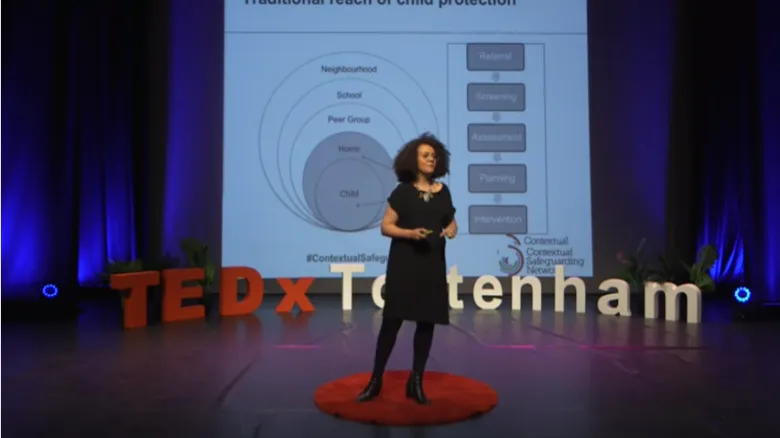
Supporting young Londoners through innovation
The lives of young Londoners are complex. Especially those that are impacted by violence and exploitation. Traditional safeguarding approaches and interventions in the UK, tend to solely look at the young person who has been identified as at risk and their immediate family setting. They can often fail to look at the wider context of their lives.
It just isn’t this straight forward. When extra-familial harm (or harm outside of the family) occurs we need to explore and address all the different settings and contexts where young people are spending time.. Our definition of Extra-familial Harm includes but isn’t limited to violence, exploitation, sexual abuse perpetrated outside of the family, intimate partner violence and harm experienced when a child goes missing. This is where Contextual Safeguarding comes in.
The approach developed by Dr Carlene Firmin, and her team at the University of Bedfordshire’s Safer Young Lives Research Centre seeks to look at the wider picture. To learn about and address the areas in which extra-familial harm occurs, as well as thinking about the areas and people who can be protective and positive, rather than focusing solely on the individuals who have been harmed as the ones who need to change.
Young people and their families who are at risk of harm are often moved to new areas. Moving away from support networks, education and potentially employment can often be detrimental to their journey of recovery. Dr Carlene Firmin explains in her Tedx Talk perfectly why we should address the areas where harm occurs, rather than move the young person away from the context.
As part of our five-year strategy, we have committed to weaving Contextual Safeguarding approaches throughout our work with young Londoners. Making sure that when we begin our work with them that we take into consideration the places and spaces where they live and spend their time, their peer networks and friendship groups and other factors such as online activity.
That’s why we are so proud to be part of the Innovate Project. Over the course of four years the project will bring together six organisations and safeguarding networks around the UK to explore three emerging frameworks and approaches to safeguarding children and young people. These are Contextual Safeguarding, Trauma-informed ethos and Transitional Safeguarding .
We were delighted when we were approached by the Innovate Project, led by Professor Michelle Lefevre at the University of Sussex, to be one of two case study sites to look at embedding Contextual Safeguarding approaches within our practice, services and support.
Over four years ourselves and Devon Children’s Services and Partners are lucky enough to have embedded researchers in our team. Their role will be that of observation and documenting our journey. They will review our current practice, procedures and case files, as well as sit in on our team meetings. Interviews with our team and the young Londoners and families we work with will also be carried out. All to evaluate how beneficial and effective embedding this approach into our service is.

At Safer London we are committed to learning. We are also committed to sharing our learnings across the sector. Supporting young people in London and across the UK can’t be done in silo. Therefore, when we have implemented practice that works, we will share this with our colleague and partners. Similarly, when we have done something that hasn’t worked, we will be forthcoming. We want other people to learn from our mistakes and more importantly not to repeat them. Only by doing this can we hope to learn and grow as a sector.
The ultimate aim of the project will be to create a wider Learning and Development Network of organisations. This network will be made up of those who wish to embed these innovative approaches into their work with children and young people. This will be supported by toolkits and guides produced as part of the four-year project.
We are excited to see where the next four years takes us. We know that only by looking at the wider context of their lives can we hope to keep young Londoners – their peers, families and communities – safe.
Discover who we are and what we do
CLICK HERE